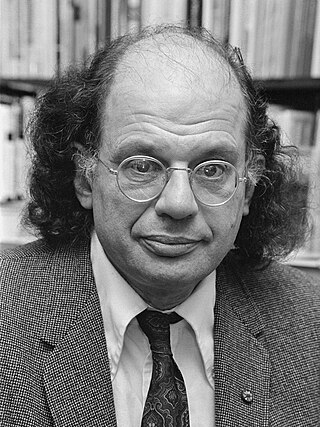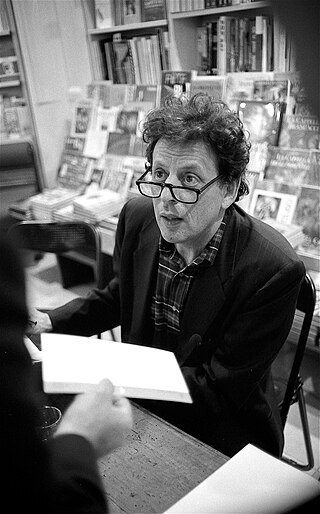Related Research Articles

Irwin Allen Ginsberg was an American poet and writer. As a student at Columbia University in the 1940s, he began friendships with William S. Burroughs and Jack Kerouac, forming the core of the Beat Generation. He vigorously opposed militarism, economic materialism, and sexual repression, and he embodied various aspects of this counterculture with his views on drugs, sex, multiculturalism, hostility to bureaucracy, and openness to Eastern religions.

Beatniks were members of a social movement in the 1950s and early 1960s who subscribed to an anti-materialistic lifestyle. They rejected the conformity and consumerism of mainstream American culture and expressed themselves through various forms of art, such as literature, poetry, music, and painting. They also experimented with spirituality, drugs, sexuality, and travel. The term “beatnik” was coined by San Francisco Chronicle columnist Herb Caen in 1958, as a derogatory label for the followers of the Beat Generation, a group of influential writers and artists who emerged in the late 1940s and early 1950s. The name was inspired by the Russian suffix “-nik”, which was used to denote members of various political or social groups. The term “beat” originally was used by Jack Kerouac in 1948 to describe his social circle of friends and fellow writers, such as Allen Ginsberg, William S. Burroughs, and Neal Cassady. Kerouac said that “beat” had multiple meanings, such as “beaten down”, “beatific”, “beat up”, and “beat out”. He also associated it with the musical term “beat”, which referred to the rhythmic patterns of jazz, a genre that influenced many beatniks.

Hair: The American Tribal Love-Rock Musical is a rock musical with a book and lyrics by Gerome Ragni and James Rado and music by Galt MacDermot. The work reflects the creators' observations of the hippie counterculture and sexual revolution of the late 1960s, and several of its songs became anthems of the anti-Vietnam War peace movement. The musical's profanity, its depiction of the use of illegal drugs, its treatment of sexuality, its irreverence for the American flag, and its nude scene caused much comment and controversy. The work broke new ground in musical theatre by defining the genre of "rock musical", using a racially integrated cast, and inviting the audience onstage for a "Be-In" finale.
"Hadda be Playin' on the Jukebox" is a poem written by Allen Ginsberg in 1975. The "Hadda" of the poem is Hadda Brooks, the American pianist, vocalist and composer, who was billed as "Queen of the Boogie".

The Beat Generation was a literary subculture movement started by a group of authors whose work explored and influenced American culture and politics in the post-World War II era. The bulk of their work was published and popularized by Silent Generationers in the 1950s, better known as Beatniks. The central elements of Beat culture are the rejection of standard narrative values, making a spiritual quest, the exploration of American and Eastern religions, the rejection of economic materialism, explicit portrayals of the human condition, experimentation with psychedelic drugs, and sexual liberation and exploration.

"Howl", also known as "Howl for Carl Solomon", is a poem written by Allen Ginsberg in 1954–1955 and published in his 1956 collection Howl and Other Poems. The poem is dedicated to Carl Solomon.
Ron Kurtenbach is a Lincoln, Nebraska Communist born January 6, 1943. A community activist, he is one of the original group which founded local Lincoln radio station KZUM and the local grocery co-op Open Harvest. He is also one of the group which founded the short-lived Lincoln Communist music venue, The Red and Black Café, in the early 1990s, a spin-off to another talk program he produced with ex-wife Sally Herrin, noted Lincoln author and teacher, and a number of others called "Zero Street". Many Lincoln bands, including Plastik Trumpet and Hour Slave played at the Red and Black.
Gerome Ragni was an American actor, singer, and songwriter, best known as one of the stars and co-writers of the 1967 musical Hair: The American Tribal Love-Rock Musical. On June 18, 2009, he was inducted into the Songwriters Hall of Fame.

Hair is a 1979 American musical anti-war comedy-drama film based on the 1968 Broadway musical Hair: The American Tribal Love-Rock Musical. Set against the backdrop of the hippie counterculture of the Vietnam era, the film focuses on a Vietnam War draftee who meets and befriends a "tribe" of hippies while en route to the army induction center. The hippies and their leader introduce him to marijuana, LSD and their environment of unorthodox relationships and draft evasion.

Hydrogen Jukebox is a 1990 chamber opera featuring the music of Philip Glass and the work of beat poet Allen Ginsberg. Its name is taken from a phrase coined by Ginsberg, from his 1955 poem Howl.

Charles Plymell is a poet, novelist, and small press publisher. Plymell has been published widely, collaborated with, and published many poets, writers, and artists, including principals of the Beat Generation.

Solo Piano (1989) is an album of piano music composed and performed by Philip Glass. It was produced by Kurt Munkacsi.

The Fall of America: Poems of These States, 1965–1971 is a collection of poetry by Allen Ginsberg, published by City Lights Bookstore in 1973, for which Ginsberg shared the annual U.S. National Book Award for Poetry. It is characterized by a prophetic tone inspired by William Blake and Walt Whitman, as well as an objective view characterized by William Carlos Williams. The content is more overtly political than most of his previous poetry with many of the poems about Ginsberg's condemnation of America's actions in Vietnam. Current events such as the Moon Landing and the 1968 Democratic National Convention, the death of Che Guevara, and personal events such as the death of Ginsberg's friend and former lover Neal Cassady are also topics. Many of the poems were initially composed on an Uher Tape recorder, purchased by Ginsberg with the help of Bob Dylan.

Howl and Other Poems is a collection of poetry by Allen Ginsberg published November 1, 1956. It contains Ginsberg's most famous poem, "Howl", which is considered to be one of the principal works of the Beat Generation as well as "A Supermarket in California", "Transcription of Organ Music", "Sunflower Sutra", "America", "In the Baggage Room at Greyhound", and some of his earlier works. For printing the collection, the publisher Lawrence Ferlinghetti, another well-known poet, was arrested and charged with obscenity. On October 3, 1957, Judge Clayton W. Horn found Ferlinghetti not guilty of the obscenity charge, and 5,000 more copies of the text were printed to meet the public demand, which had risen in response to the publicity surrounding the trial. Howl and Other Poems contains two of the most well-known poems from the Beat Generation, "Howl" and "A Supermarket in California", which have been reprinted in other collections, including the Norton Anthology of American Literature.
"Todesfuge" (Deathfugue) is a German language poem written by the Romanian-born poet Paul Celan probably around 1945 and first published in 1948. It is one of his best-known and often-anthologized poems. Despite critics claiming that the lyrical finesse and aesthetic of the poem did not do justice to the cruelty of the Holocaust, others regard the poem as one that "combines mysteriously compelling imagery with rhythmic variations and structural patterns that are both elusive and pronounced". At the same time it has been regarded as a "masterful description of horror and death in a concentration camp". Celan was born to a Jewish family in Cernauti, Romania ; his parents were murdered in the Holocaust, and Celan himself was a prisoner for a time in a work camp. The poem has reached international relevance by being considered to be one of the most important poems of the post-war period and the most relevant example of Trümmerliteratur.
"The War Is Over" is an anti-war song by Phil Ochs, an American protest singer in the 1960s and early 1970s. Ochs was famous for harshly criticizing the Vietnam War and the American military-industrial establishment. The song, which was originally released on Tape from California (1968), has been described as "one of the most potent antiwar songs of the 1960s".
"Wichita Vortex Sutra" is an anti-war poem by Allen Ginsberg, written in 1966. It appears in his collection Planet News and has also been published in Collected Poems 1947-1995 and Collected Poems 1947-1980. The poem presents Ginsberg as speaker, focusing on his condemnation of the Vietnam War. It features imagery of the war and America's Heartland interspersed with news reports and cultural references. It is also written in Ginsberg's distinctive Whitman-like long-prose style.

Viet Rock is a rock musical by Megan Terry that served as inspiration to the musical Hair. A violent denunciation of the American involvement in the Vietnam War, the play was described by its author as a "folk war movie" comprising scenes of disillusionment and protest to the American military presence in Southeast Asia. Viet Rock is widely considered to be the first rock musical written and performed in the United States, as well as the first protest play about Vietnam. Its premiere also marks the first major theatre production in the United States in which actors left the stage to interact directly with the audience.

Songs of Innocence and Experience is an album by American beat poet and writer Allen Ginsberg, recorded in 1969. For the recording, Ginsberg sang pieces from 18th-century English poet William Blake's illustrated poetry collection of the same name and set them to a folk-based instrumental idiom, featuring simple melodies and accompaniment performed with a host of jazz musicians. Among the album's contributors were trumpeter Don Cherry, arranger/pianist Bob Dorough, multi-instrumentalist Jon Sholle, drummer Elvin Jones, and Peter Orlovsky – Ginsberg's life-partner and fellow poet – who contributed vocals and helped produce the recording with British underground writer Barry Miles.
"September on Jessore Road" is a poem by American poet and activist Allen Ginsberg, inspired by the plight of the East Bengali refugees from the 1971 Bangladesh Liberation War. Ginsberg wrote it after visiting the refugee camps along the Jessore Road in West Bengal in India. The poem documents the sickness and squalor he witnessed there and attacks the United States government's indifference to the humanitarian crisis. It was first published in The New York Times on November 14, 1971. Further to topical songs by George Harrison and Joan Baez, the poem helped ensure that the Bangladesh crisis became a key issue for the youth protest movement around the world.
References
- 1 2 3 Ragni, Gerome and James Rado (Lyricists), Galt MacDermot (Composer), and Original Broadway Cast (Vocalists). (1968) Hair [Audio Recording]. RCA Victor. Event occurs at Track 28, "Three-Five-Zero-Zero".
- 1 2 Miller, Scott (2001). "HAIR – An analysis by Scott Miller"; excerpt from Rebels with applause: Broadway's groundbreaking musicals. Portsmouth, NH: Heinemann. ISBN 0-325-00357-2
- 1 2 Ginsberg, Allen. Initial portion of "II" in "Wichita Vortex Sutra"